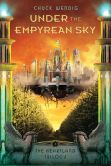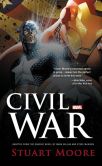Reading Roundup
I’ve fallen a bit behind in book reviews, so I’m going to do a quick threesome to get caught up.
#

Cael is a young scavenger, sailing over the endless sea of corn, searching for anything they can sell to bring in a few extra bucks. Life in the Heartland pretty much bites the wax tadpole, but the Empyrean government in their floating cities are the blaster-wielding Goliath to the Heartland’s slingshot-carrying David, making it difficult for folks like Cael to do anything beyond grumble and survive the best they can.
This is book one of a trilogy, and there’s a lot of worldbuilding and groundwork being laid out. It’s fast-paced, gritty, and dark. (I did mention it was a dystopian story, right?) There are some very cool ideas here, from the corn that can infest and grow into people’s bodies to the different ways people attempt to rebel against their rulers.
A little grim for my personal taste, but a lot of creativity and plenty of action, and it ends with the promise of even more to come in book two.
#
 Next up is the award-winning God’s War [Amazon | B&N | Mysterious Galaxy], by Kameron Hurley. This one’s even grittier than Wendig. Here’s a quick summary from the Publishers Weekly review:
Next up is the award-winning God’s War [Amazon | B&N | Mysterious Galaxy], by Kameron Hurley. This one’s even grittier than Wendig. Here’s a quick summary from the Publishers Weekly review:
On a planet settled by Muslims and ravaged by constant war and pollution, Nyx, a former government-sponsored assassin or “bel dame,” gets by as a bounty hunter. Her assistant is the foreign magician Rhys, who can control the ubiquitous insects that drive the planet’s technology.
There’s a lot I really liked about this one, starting with the bugs. Hurley creates an entire world that runs on insect-based technology, from glowing bugs in lamps to carefully-bred beetles that can be used to deliver injections or draw blood to organic vehicles that run on bug-powered engines. The whole biological and genetic technologies are fascinating and engaging.
I also appreciate the central role of religion in the story, and the different perspectives we get from devout characters like Rhys and characters who appear to have turned their backs on God, like Nyx. That said, it bothers me that we have a planet colonized by Muslims that’s spent the past 3000 years fighting a religious war. I don’t know if this is something that will be addressed in the next books, if we get a broader view of the universe, but for now, this struck me as problematic.
The society Hurley creates has become dominated by women, in part as an effect of the neverending war. It was fascinating to see the reversals and changes.
Overall, not an easy book to read: it’s dark, different, at times troubling, and often thoughtful. Despite my reservations, I’m curious about the larger universe, and will probably be picking up the next one to see what happens.
#

When a tragic battle blows a hole in the city of Stamford, killing hundreds of people, the U.S. government demands that all super heroes unmask and register their powers. To Tony Stark – Iron Man – it’s a regrettable but necessary step. To Captain America, it’s an unbearable assault on civil liberties…
I like the premise of the story a lot, the struggle between security and liberty, the danger of superpowered individuals and collateral damage. Unfortunately, the story didn’t really work for me. I certainly enjoyed watching Iron Man and Thor go toe-to-toe in The Avengers, but during that battle, you never really had the sense they would go so far as to kill one another.
That’s not the case in this book, which turns superheroes into deadly enemies … and that’s where I kept getting kicked out of the story. I couldn’t suspend my disbelief enough to accept that these characters would let themselves get so out of control. I get the urge to make them more human and flawed, I thought it went too far. While there are exceptions, I generally want my superhero stories to feature heroes I can actually like.
There were some good bits, and it was certainly a fast read, but it’s not one I’m likely to reread.






Martin
February 18, 2014 @ 9:42 am
I liked “Under the Empyrean Sky” too. “God’s war” makes me struggle too, but i really like the author an her blogs (he “Persistence”-entry is one of the best i ever read). With “Civil War” i still have a hung jury on wether to read it or not. Superheroes are not my prefered topic.
Jayle Enn
February 18, 2014 @ 10:26 am
I’ve heard good things about Empyrean Sky, but I haven’t got around to picking it up. God’s War and its three thousand years of warfare in a Muslim state threw a red flag– hell, three thousand years of warfare would get my eyebrow rising, period. I’d probably pick it up at the library for a first glance and go from there.
Civil War is terrible. I read it and the spinoffs in the funny papers, and it was deeply disappointing. It starts out by confronting superheroic culture, with its lack of accountability, tendency toward collateral damage and extreme risk to innocents, but goes violently off the rails when the pro-registration figures start putting on their technocrat hats and jackboots. It’s a worthy argument, one Wildstorm and Watchmen have tackled in the past, but when one side is willing to kill without remorse, use supporters as sacrificial lambs, and shuttle dissidents off to an extradimensional Gitmo that induces suicidal depression, it’s really obvious that these aren’t the heroes the reader knows, but a bunch of straw dummies stuffed into their spandex.
Rev. Bob
February 18, 2014 @ 1:44 pm
I tried God’s War, but I just haven’t been able to get into it. I mean that literally; I can’t get past the first chapter or two before getting stuck. Every so often, I consider giving it another shot, but I’ve got so many other books on the TBR stack…
Katherine
February 18, 2014 @ 5:19 pm
Under the Empyrean (i’m on pain meds and can’t remember how to spell that, sorry :/) Sky is on my list, and I’ll have to put it higher on my list, methinks! Thanks for review-goodness 🙂
My favourite recent read, I don’t know if you’ve read it or not, is Seanan McGuire’s Indexing – loved it!!!
Jim C. Hines
February 18, 2014 @ 6:41 pm
I haven’t read Indexing yet, but Seanan’s stuff is generally toward the top of my Wish List 🙂
lkeke35
February 18, 2014 @ 8:38 pm
I loved Hurley’s first two books. I loved the lead character and it’s as gritty as everyone claims.
I’ll watch Marvel films but I don’t read anything Marvel related anymore.
I’ve read a few of Wendig’s books but am currently avoiding books with young people in them. Not because I dislike them ( I really really want to read this one) but because I don’t have the time.